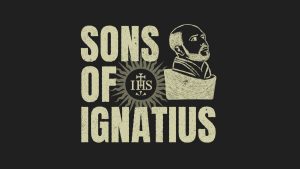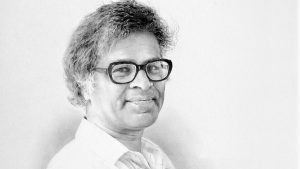Jim Hayes SJ
 AMDG Express has saluted two of the Irish Jesuits working in Britain: Kieran Barry-Ryan and (post-humously) Jack Donovan. Jack’s near-contemporary, Jim Hayes, is living in Liverpool, but for many years he has hardly featured on the horizons of Province activities despite a remarkably active priestly life. The photo shows Jim with his ordination class. Click on ‘Read more’ below for Paul Andrews’ report on a recent conversation with Jim.
AMDG Express has saluted two of the Irish Jesuits working in Britain: Kieran Barry-Ryan and (post-humously) Jack Donovan. Jack’s near-contemporary, Jim Hayes, is living in Liverpool, but for many years he has hardly featured on the horizons of Province activities despite a remarkably active priestly life. The photo shows Jim with his ordination class. Click on ‘Read more’ below for Paul Andrews’ report on a recent conversation with Jim.
When I rang Jim Hayes to hear his story, one picture stayed vividly with me. Jim asked had I seen “Tunes of Glory”, and in particular the scene in an officers’ mess, where you see officers at each end of the dining room table, eating in a shared solitude, with nobody saying hello. Jim’s first breakfast in Belvedere, in the early 70s, was like that. He had moved across the city from Milltown, appointed as Minister to a large community which he had never known before. He sat at one end of the table, some of the brethren gathered at the other end, and nobody greeted the newcomer or said hello. Things eased with time. Rupert Coyle, Michael Reidy, Jim Dunne and others became and remained good friends. But the Belvedere of 1970 tolerated unfriendliness, even inhumanity, in a way that reduced everyone’s energy.
Jim is remembered in both Milltown and Belvedere not just for efficiency as a Minister, but for an almost maternal eye for the needs of the brethren, and readiness to take pains and spend money to meet those needs. He is remembered with affection, and it is important for him to realise that.
Despite his frosty start in Belvedere, he worked hard at his job and grew to like it there; so he was sad, and felt it as something of a reproach, when the Provincial moved him after three years. He is happy to recall that years later the same Provincial wrote to him with an apology for making that move, and an acknowledgement that he had followed the wrong advice and done Jim an injustice.
After a short spell in his native Limerick, (at that time there were more priests in its main street than in the whole of Zambia), he was invited by Fr Oliver McTiernan to ease the shortage of priests in London. With the support of both Irish and British Provincials he moved to Islington for fifteen happy years. Both Oliver and Bruce Kent, his companions in Islington, later left priestly ministry, but Jim stayed with his parish, schools and hospital.
In the mid-1980s he felt moved to offer himself for the diocese of Aberdeen, where the shortage of priests was so chronic that it survived only through an infusion of Jesuit volunteers. Jim was parish priest in a Highlands parish west of Inverness, then in a city parish, and then for seven years in the Shetland Islands. When he went there, he found only four native Catholics, but with the development of the oil fields their number was swollen by a surge of workers, from Scotland, England, Ireland, Poland and elsewhere.
Despite the loneliness and the long winter nights, Jim enjoyed Shetland very much, moving round his parish by car and boat. But ten years ago he found that his half-moon glasses no longer served him adequately. A specialist told him that he was suffering from loss of central vision due to diabetes (of which he was unaware). His sight gave way suddenly. He could not distinguish parishioners, and he knew he had to leave the parish and the island.
He was happy to accept an invitation from the British Provincial to serve as full-time chaplain in the Catholic Institute for the Blind in Liverpool. He had to give up the chaplain’s post when he found he could no longer see faces clearly enough to recognise them. Now he is a resident, in a state of high dependency, blind and afflicted by Parkinson’s, but still able to celebrate Mass. When I asked him about the good and bad years in his memory, he said that most of his years had been good, but the last year has been an annus horribilis. Is there anything we can do to bring this good Jesuit closer?











